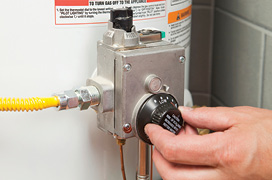
Whether you leave your home for the entire winter season, getting away on a vacation or just going away for week or two over the holidays, it’s smart to ‘winterize’ your home to help prevent any damage and potentially costly repairs.
You can use these winterizing tips to make sure that your home is ready to handle the cold weather while you’re away:
- Shut off your property’s water supply at the main valve to prevent unwanted pressurized water entering your home and call a plumber if you need help doing it.
- Open all faucets to let water drain from pipes after shutting off the main. Call a plumber to help you open all faucets (inside and outside) after shutting down the main water supply and let them drain. Your water main delivers pressurized water to your home but any remaining water in pipes could freeze in extreme wintry conditions. Do this only after shutting off the main!
- Set your thermostat to the lowest temperature that will prevent pipes or anything else from freezing (at least 50 to 55 degrees).
- Clean all gutters to help water drain and flow through them. Remove all leaves and other debris, this helps prevent interior leaks and most ice dams.
- Remove yard furniture, clean up your yard and secure any items that could be dislodged or have the potential to become missiles in severe wind conditions.
- Let neighbors know that you’re going to be away. Ask them to keep watch on your home, let you know of any unusual activity or damage and always give them your winter contact details.
- Shut down natural gas or propane lines to help reduce or eliminate the risk of accidental release, which may cause a fire or dangerous ignition. NEVER attempt to work with your propane or natural gas line without calling your propane or natural gas provider.
- Unplug all electronic devices and appliances to help maintain low electric bills while you’re away. Always unplug power strips to protect electronics from power surges, as they use some electricity even when switched “off.” This also prevents random sparks from overheating wires, reducing fire risk.
- Drain your water heater, along with your interior pipes. Unless you are very confident or experienced, it’s always best to contact a plumber to do this for you to prevent any accidental flooding.
- If you have a basement sink, simply hook up a hose from your water heater to the sink to drain the 30 to 60 gallons a typical home water heater holds. All the particles and sediment that has collected in the bottom of the water heater, which inhibit efficiency, will also be washed away
- Install a water flow sensor and low temperature sensor on your main water supply pipe
- Linking these sensors to a 24/7 monitored alarm system or your smartphone will alert you about problems while you’re away.
- Already have a round-the-clock intruder alarm system? Have them install these sensors for you and download a smartphone app for notification of problems. Need help installing sensors? It’s best to call your plumber.
- Blow air through your pipes to rid your plumbing of any remaining water. Call your plumber to have them use an air compressor to do this for you, to better ensure that your pipes will not freeze.
